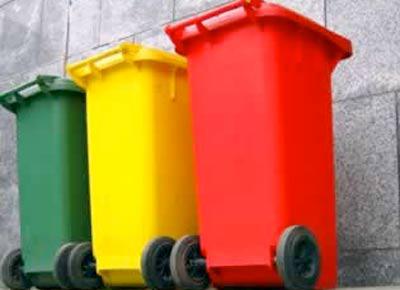(单词翻译:单击)
情景对话
Todd: So, Keiko, so you lived in The States and they have a different system of collecting trash. Can you explain the difference of collecting trash in America and collecting trash in Japan?
托德:惠子,你曾在美国生活过,美国的垃圾收集系统与日本的不同。你能解释一下美国的垃圾收集系统和日本的有什么不同吗?
Keiko: OK, my personal experience, in The States you just put everything in one place whereas in Japan you have to divide it into five different places but actually where I live in Kawasaki it's actually quite easy so I only have to divide into two garbage: one burnable, the other one non-burnable. That's it, but in the states, you just put everything together.
惠子:好,就我个人的经验来看,美国是把所有垃圾都放在一个地方,而日本要对垃圾进行分类,垃圾要放在五个不同的地方,我住在川崎,那里的垃圾分类很简单,所以我们只需要进行两种分类就好,一种是可燃垃圾,另一种是不可燃垃圾。而美国是把所有垃圾都放在一起。
Todd: Right, it's really weird cause when I go home and I have trash I feel guilty. There's two things I feel strange about: One is in Japan I take off my shoes, when I go home, in America I feel strange walking in a house with my shoes on and the other is trash. When I go to throw away trash, I'm just throwing it away and I don't have to put in the right bin. It always feels a little strange.
托德:对,这很奇怪,我回美国的时候,一有垃圾我就会有内疚感。有两件事我感到很奇怪,首先在日本的时候我回家以后就会脱鞋,可是在美国的时候,我会穿着鞋在房子里走来走去,这点很奇怪,另一件奇怪的事就是垃圾。在美国,我去扔垃圾的时候,就只要把垃圾扔掉就行了,不用分类放在对应的垃圾箱里。这让我觉得有点儿奇怪。
Keiko: But that means that somebody's — at the end, somebody is doing all the dividing work in The States, right?
惠子:这是不是意味着,美国会有最后统一进行分类工作的人?
Todd: Unfortunately, I don't know. I think maybe some communities but maybe a lot, they just bury it. I think in The States, cause we have a lot more land, we just bury a lot of the trash. We don't burn it like you do in Japan, so. You were saying that in Japan, it's different from region to region how you separate trash.
托德:不幸地是,我不知道。我想可能有些社区最后会进行分类,不过大部分社区应该就只是把垃圾埋了。美国国土广大,所以可能大部分垃圾我们会埋掉。而不是像日本那样烧掉。你刚说,日本不同地区的垃圾分类也有不同。
Keiko: I think Tokyo is really strict, whereas Kanagawa is a little bit easy and I don't know why but I have to be even more careful when I'm at work, so even when I'm busy, I eat my lunch, you know, I take out my lunch garbage and I have to put, you know, chopstick here, a plastic box here, and a plastic bag here, and yeah, it's quite, quite a work.
惠子:我认为东京的垃圾分类很严格,而川崎的垃圾分类就很简单,我不知道这是什么原因,不过我在上班的时候要格外留意,即使我特别忙的时候,吃完午饭去扔垃圾时,也要注意把筷子放在这个垃圾箱里,塑料盒放在那个垃圾箱里,塑料袋放在另一个垃圾箱里,很复杂。
Todd: I hear ya. OK. Thanks a lot Keiko.
托德:我明白了。好,非常谢谢你,惠子。

译文属可可原创,仅供学习交流使用,未经许可请勿转载
重点讲解
重点讲解:
1. divide into (使)分开;(使)分散;(使)分裂;
例句:We divide into pairs and each pair takes a region.
我们分成两人一组,每一组负责一个区域。
2. take off 脱下,脱掉(衣物);
例句:The doctor gestured me to take off my coat.
医生做手势要我脱去外套。
3. throw away 扔掉,丢掉(废弃物);
例句:I never throw anything away.
我什么东西都不舍得扔。
4. at the end 最后;
例句:You will have the chance to ask questions at the end.
最后你会有提问的机会。


